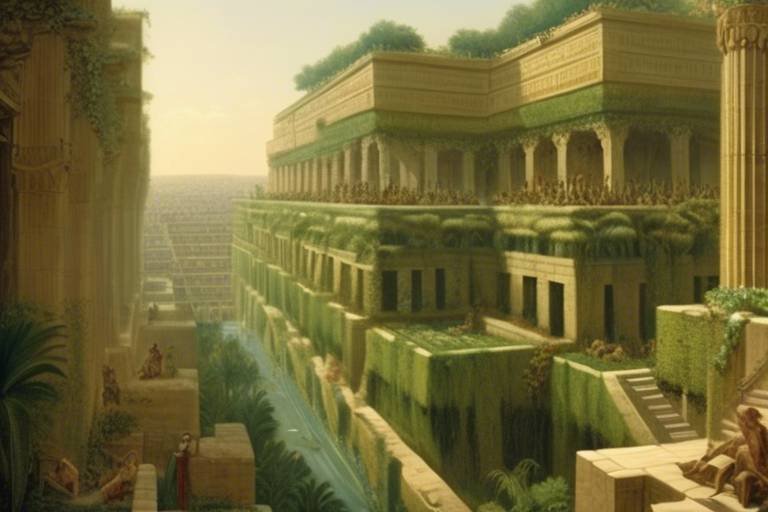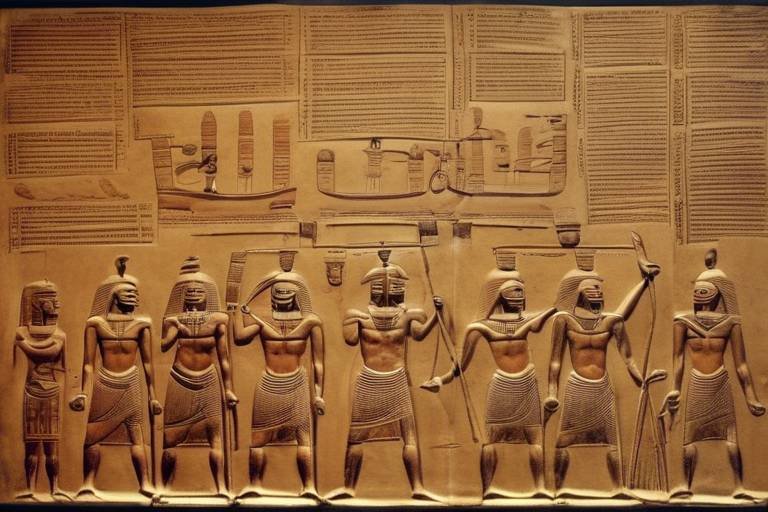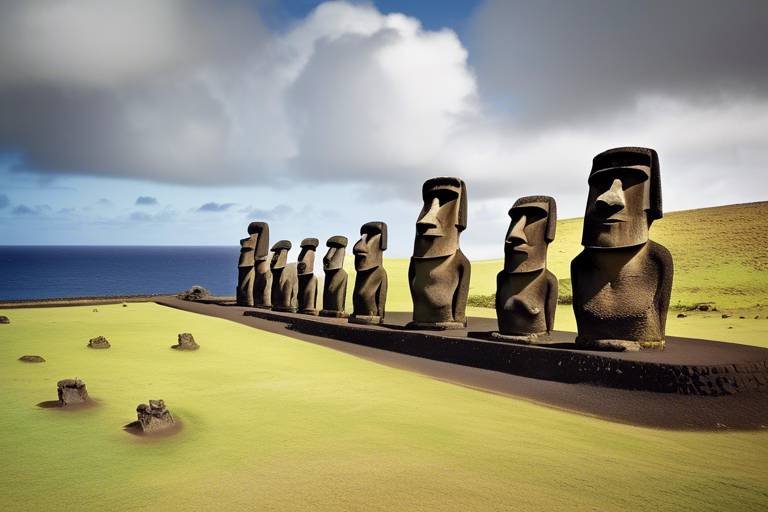The Enigma of the Ancient Egyptians' Knowledge of Medicine
When delving into the enigmatic realm of ancient Egyptian civilization, one cannot help but be mesmerized by the profound depth of their knowledge in the field of medicine. The mysteries surrounding their medical practices and expertise continue to intrigue and astound historians and scholars alike. Through the sands of time, the ancient Egyptians have left behind a legacy of medical wisdom that transcends generations, sparking curiosity and admiration for their advanced understanding of healthcare.

Historical Context
The ancient Egyptians' prowess in medicine remains a captivating mystery, showcasing their advanced knowledge and innovative practices that defied the norms of their time.
In the grand tapestry of history, the ancient Egyptian civilization emerges as a beacon of ingenuity and sophistication. Flourishing along the fertile banks of the Nile River, the Egyptians cultivated a society steeped in mystique and grandeur. Amidst the awe-inspiring pyramids and intricate hieroglyphics, their medical knowledge stood as a testament to their intellectual prowess. During a time when much of the world languished in ignorance, the ancient Egyptians delved into the realms of healing and medicine with unparalleled dedication and skill.

Medical Practices
When delving into the realm of ancient Egyptian medicine, one cannot overlook the fascinating array of that were employed by the physicians of that time. These practices were not only innovative but also deeply rooted in the cultural and religious beliefs of the ancient Egyptians. The medical practitioners of this era were highly skilled and possessed a wealth of knowledge that allowed them to treat a variety of illnesses and injuries.
A key aspect of ancient Egyptian medical practices was the emphasis on observation and diagnosis. Physicians would carefully examine the patient's symptoms and conditions before determining the appropriate course of treatment. This methodical approach to healthcare set the foundation for the development of more advanced medical practices in the future.
Furthermore, ancient Egyptian physicians were known for their expertise in pharmacology and compounding medicines. They utilized a wide range of natural substances, including plants, minerals, and animal products, to create remedies for various ailments. The use of herbal medicines was particularly prevalent, with certain plants believed to possess healing properties that could alleviate symptoms and promote recovery.
Another notable aspect of ancient Egyptian medical practices was the integration of magic and spirituality into healthcare. The belief in the healing power of gods and the use of rituals to invoke divine intervention were common practices in medical treatment. This intersection of religion and medicine highlights the holistic approach that ancient Egyptians took towards healing.
Moreover, the practice of preventative medicine was also a significant component of ancient Egyptian healthcare. Physicians emphasized the importance of maintaining overall health and well-being through proper diet, hygiene, and lifestyle choices. This proactive approach to healthcare aimed to prevent illnesses before they manifested, showcasing the foresight and wisdom of these ancient healers.

Herbal Remedies
Exploring the historical background of ancient Egyptian civilization reveals a fascinating intersection of advanced medical knowledge and mystical beliefs. In the context of the time period, the significance of their medical practices transcends mere physical healing, delving into the realms of spirituality and cultural identity.
Ancient Egyptian medicine was deeply rooted in the use of herbal remedies, harnessing the healing properties of plants to treat a myriad of ailments. The Egyptians believed in the power of nature to cure diseases and maintain overall well-being. Plants like aloe vera, garlic, and frankincense were commonly used in medicinal preparations, showcasing the extensive botanical knowledge of the ancient physicians.
Moreover, the Ebers Papyrus, one of the oldest preserved medical texts from ancient Egypt, contains detailed descriptions of various herbal remedies and their applications. The papyrus provides insights into the meticulous process of preparing herbal concoctions and the specific dosages recommended for different conditions.
Furthermore, the Egyptians revered certain plants for their symbolic significance in religious rituals and healing ceremonies. For instance, the blue lotus flower was associated with rebirth and spiritual enlightenment, often used in medicinal preparations to induce a sense of calm and tranquility.
It is truly remarkable how the ancient Egyptians integrated the natural world into their medical practices, viewing plants not just as sources of medicine but as sacred entities with intrinsic healing properties.

Surgical Procedures
Ancient Egyptian physicians were pioneers in the field of medicine, showcasing remarkable expertise in surgical procedures that were advanced for their time. The practice of surgery in ancient Egypt was not only limited to external injuries but also extended to complex procedures like brain surgery and trepanation. These skilled doctors utilized a variety of tools and techniques to perform surgeries, displaying a level of precision and knowledge that is truly astounding.
One of the most well-known surgical practices of the ancient Egyptians was mummification, a complex process that involved the removal of organs, preservation of the body, and wrapping it in linen bandages. This intricate procedure required a deep understanding of human anatomy and the preservation of tissues, showcasing the advanced knowledge possessed by ancient Egyptian physicians.
Ancient Egyptian doctors also excelled in treating injuries, fractures, and wounds through surgical interventions. They used tools such as scalpels, forceps, and probes to perform delicate surgeries, demonstrating a level of skill and expertise that was ahead of its time. The meticulous attention to detail and the precision with which these surgeries were conducted highlight the advanced surgical capabilities of ancient Egyptian medical practitioners.
Furthermore, surgical procedures in ancient Egypt were not only limited to physical ailments but also extended to treating spiritual and mental health issues. The holistic approach to healthcare encompassed both the physical and spiritual aspects of well-being, showcasing a comprehensive understanding of human health and healing.
In conclusion, the surgical procedures practiced by ancient Egyptian physicians were groundbreaking for their time, showcasing a level of sophistication and knowledge that is truly remarkable. Their advanced techniques and tools paved the way for future advancements in the field of medicine, leaving behind a legacy that continues to inspire and intrigue modern medical professionals.

Medical Instruments
When it comes to the ancient Egyptians' knowledge of medicine, one cannot overlook the remarkable advancements in medical instruments that were utilized by physicians of that era. These instruments were not only a testament to their ingenuity but also played a crucial role in diagnosing and treating various medical conditions.
One of the most iconic medical instruments associated with ancient Egyptian medicine is the "bronze surgical knife." This tool, crafted with precision from bronze, was used for procedures such as surgeries and mummification. The sharpness and durability of these knives showcased the craftsmanship and skill of ancient Egyptian metalworkers.
In addition to surgical knives, ancient Egyptian physicians also utilized a variety of diagnostic tools to assess patients' conditions. Instruments like the "bronze tweezers" were instrumental in extracting foreign objects from wounds, showcasing a level of detail and care in their medical practices.
Furthermore, the use of "copper needles" for acupuncture and "stone jars" for storing medicinal substances highlighted the diverse range of medical instruments employed by ancient Egyptian healers. These tools not only reflected their understanding of medical principles but also their resourcefulness in utilizing materials available to them.
Moreover, the intricately designed "copper scalpels" and "bone saws" exemplified the advanced surgical techniques practiced by ancient Egyptian doctors. These instruments allowed for precise incisions and amputations, demonstrating a level of expertise that was ahead of its time.
Overall, the medical instruments used by ancient Egyptian physicians were a blend of innovation, functionality, and cultural significance. Each tool served a specific purpose in the realm of medical treatment, showcasing the holistic approach that the Egyptians took towards healthcare.

Religious Beliefs and Medicine
Exploring the intersection of religious beliefs and medical practices in ancient Egypt unveils a fascinating tapestry of spirituality woven into the fabric of healthcare. The ancient Egyptians believed that health and well-being were closely tied to the divine realm, with gods and goddesses playing a pivotal role in healing the sick and injured.
One of the central tenets of ancient Egyptian medicine was the concept of Ma'at, the goddess of truth, balance, and order. Ma'at symbolized harmony in all aspects of life, including health. Physicians and healers sought to maintain Ma'at by aligning the body, mind, and spirit through rituals and treatments that honored the gods.
The practice of medicine in ancient Egypt was deeply intertwined with religious rituals and ceremonies. Priests, who were considered intermediaries between the mortal world and the divine, often performed healing ceremonies invoking the blessings of specific deities associated with health and healing.
For example, the god Thoth, the patron of medicine and knowledge, was revered for his wisdom and healing powers. Physicians would call upon Thoth for guidance and assistance in diagnosing and treating illnesses. Similarly, the goddess Sekhmet, known as the goddess of healing and war, was invoked to ward off plagues and epidemics.
Moreover, the ancient Egyptians believed in the power of amulets and charms to protect against illness and promote healing. These magical objects were inscribed with spells and incantations invoking the protection of various gods and goddesses, serving as talismans of health and vitality.
Religious beliefs also influenced the ethical principles guiding medical practice in ancient Egypt. Physicians were expected to uphold moral codes dictated by the gods, emphasizing compassion, integrity, and respect for life. Healing was seen as a sacred duty, requiring practitioners to act with humility and reverence for the divine forces at play.
In conclusion, the intertwining of religious beliefs and medicine in ancient Egypt created a holistic approach to healthcare that honored the spiritual dimensions of healing. The legacy of this symbiotic relationship between the sacred and the scientific continues to resonate in modern healthcare practices, reminding us of the enduring wisdom of the ancient Egyptians in their quest for well-being.

Healthcare System
Throughout history, the ancient Egyptians have mystified and intrigued scholars with their advanced knowledge of medicine. From intricate surgical procedures to the use of herbal remedies, their medical practices were both innovative and ahead of their time. Let's delve into the enigmatic world of ancient Egyptian medicine and uncover the secrets of their healthcare system.
Within the ancient Egyptian civilization, the healthcare system was a complex and well-organized structure that integrated various elements of society. At the heart of this system were the physicians, who held a revered position and were highly skilled in diagnosing and treating a wide range of illnesses. These physicians often worked in tandem with priests, who believed that healing was not only a physical process but also a spiritual one.
Moreover, specialized medical practitioners, such as dentists and surgeons, played crucial roles in providing specialized care to patients. The ancient Egyptians also had designated medical facilities, including temples dedicated to healing deities like Imhotep, the god of medicine. These temples served as centers for medical treatment and spiritual healing, showcasing the interconnectedness of religion and medicine in ancient Egyptian society.
Furthermore, the healthcare system in ancient Egypt was not limited to physical ailments but also encompassed mental and emotional well-being. Mental health practitioners, known as "dream interpreters," used dreams as a diagnostic tool to understand the underlying psychological issues affecting individuals. This holistic approach to healthcare highlights the comprehensive nature of medical care in ancient Egypt.
Additionally, the healthcare system was supported by a network of pharmacies that dispensed herbal remedies and medicinal concoctions. These pharmacies, often located within temple complexes, provided access to a wide array of plant-based medicines that were used to treat various conditions. The ancient Egyptians had a profound understanding of the healing properties of plants and herbs, harnessing nature's bounty to alleviate suffering and promote well-being.
Overall, the healthcare system in ancient Egypt was a sophisticated and multifaceted structure that prioritized the well-being of individuals and the community as a whole. By combining medical expertise with spiritual beliefs and a deep connection to the natural world, the ancient Egyptians created a healthcare system that was truly ahead of its time.

Legacy of Ancient Egyptian Medicine
Ancient Egyptian medicine holds a remarkable legacy that continues to influence modern healthcare practices. The knowledge and techniques developed by Egyptian physicians have left an indelible mark on the history of medicine, shaping the way we approach healthcare today. Through their innovative practices and deep understanding of the human body, the ancient Egyptians paved the way for advancements in medical science that have stood the test of time.
One of the most enduring aspects of ancient Egyptian medicine is their holistic approach to health and well-being. Physicians in ancient Egypt believed in treating the body, mind, and spirit as interconnected elements, recognizing the importance of a balanced and harmonious existence. This holistic approach laid the foundation for the concept of preventive medicine, emphasizing the importance of maintaining overall health to prevent illness.
Furthermore, the ancient Egyptians' meticulous record-keeping and documentation of medical knowledge have provided invaluable insights into the evolution of medical practices. Their detailed medical texts, such as the Ebers Papyrus and the Edwin Smith Papyrus, offer a glimpse into the diagnostic techniques, treatments, and surgical procedures used by ancient Egyptian physicians.
Moreover, the legacy of ancient Egyptian medicine can be seen in the enduring influence of herbal remedies and plant-based treatments. The Egyptians were adept at harnessing the healing properties of various herbs and plants, using them to treat a wide range of ailments. Their extensive knowledge of botanical medicine laid the groundwork for the development of pharmacology and the use of natural remedies in modern healthcare.
Additionally, the advanced surgical techniques practiced by ancient Egyptian doctors, including procedures such as trepanation and limb amputation, demonstrate their remarkable skill and expertise in the field of surgery. The meticulous care taken in performing surgical procedures, as evidenced by the successful mummification practices, highlights the precision and knowledge possessed by ancient Egyptian physicians.
Overall, the legacy of ancient Egyptian medicine serves as a testament to the ingenuity, innovation, and dedication of the physicians and healers of that era. Their contributions to the field of medicine have transcended time, leaving a lasting impact on the practice of healthcare and inspiring generations of medical professionals to continue pushing the boundaries of medical knowledge and innovation.
Frequently Asked Questions
- What were the main medical practices of ancient Egyptian physicians?
Ancient Egyptian physicians employed a variety of medical practices, including surgery, dentistry, and the use of herbal remedies. They also practiced diagnostic techniques such as pulse-taking and observation of symptoms to determine the nature of illnesses.
- How did ancient Egyptians view the connection between religion and medicine?
Ancient Egyptians believed that health and illness were closely linked to the spiritual realm. They often sought healing through rituals, prayers, and offerings to gods associated with healing, such as the goddess Isis and the god Thoth.
- What role did herbal remedies play in ancient Egyptian medicine?
Herbal remedies were a cornerstone of ancient Egyptian medicine, with physicians using a wide range of plants and botanical substances to treat various ailments. Plants such as aloe vera, garlic, and poppy were commonly used for their medicinal properties.
- How did ancient Egyptian physicians approach surgical procedures?
Ancient Egyptian physicians were skilled in performing various surgical procedures, including amputations, wound suturing, and even brain surgery. They used tools such as scalpels, forceps, and probes to carry out these intricate procedures.
- What was the organization of the healthcare system in ancient Egypt?
The healthcare system in ancient Egypt was well-organized, with different classes of medical practitioners serving specific roles. Physicians, priests, and specialized healers each played a vital part in providing healthcare services to the population.



















